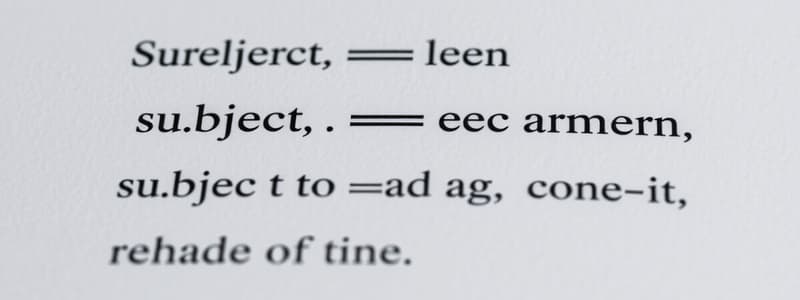Podcast
Questions and Answers
When two singular nouns are connected by 'or', what type of verb should be used?
When two singular nouns are connected by 'or', what type of verb should be used?
- Singular verb (correct)
- Plural verb
- No verb needed
- Both singular and plural verbs
In the sentence 'The team captain, as well as the players, ___ anxious', what verb form is correct?
In the sentence 'The team captain, as well as the players, ___ anxious', what verb form is correct?
- be
- are
- is (correct)
- were
What type of verb should be used when the subject of a sentence is a collective noun?
What type of verb should be used when the subject of a sentence is a collective noun?
- Singular verb (correct)
- Plural verb
- No verb needed
- Either singular or plural based on context
When both a singular and a plural noun are connected by 'or', what should the verb agree with?
When both a singular and a plural noun are connected by 'or', what should the verb agree with?
Which of the following words is singular and requires a singular verb?
Which of the following words is singular and requires a singular verb?
Flashcards are hidden until you start studying
Study Notes
Subject-Verb Agreement Rules
- Agreement Basics: The verb must agree with the number of the subject (singular or plural).
- Compound Subjects with 'and': Use a plural verb for subjects connected by 'and.' Example: "She and her friends are at the fair."
- Compound Subjects with 'or' or 'nor': Use a singular verb when singular nouns are connected. Example: "The book or the pen is in the drawer."
- Mixed Subject Agreement: When a singular noun and a plural noun are connected by 'or' or 'nor,' the verb agrees with the nearest subject. Example: "The boy or his friends run every day."
- Interrupting Phrases: A phrase between the subject and verb does not affect verb agreement; the verb should align with the main subject. Example: "One of the boxes is open."
- Singular Indefinite Pronouns: Words like each, anyone, and nobody are singular and require a singular verb. Example: "Each of these hot dogs is juicy."
- Special Noun Rules: Nouns like civics and mathematics take a singular verb. Example: "The news is on at six." With dollars, use a singular verb for total amounts (e.g., "Five dollars is a lot") but plural when discussing the currency itself (e.g., "Dollars are often used...").
- Plural Nouns for Pairs: Items like scissors and pants are considered plural; therefore, they require a plural verb. Example: "These scissors are dull."
- Inversion with 'there is/are': In constructions starting with "there is" or "there are," the subject follows the verb, and the verb agrees with the subject that comes after. Example: "There are many questions."
- Collective Nouns: Collective nouns (team, committee, etc.) are treated as singular and take a singular verb. Example: "The team runs during practice."
- Additional Expressions: Phrases like "together with" do not change the subject number. If the main subject is singular, the verb remains singular. Example: "The President, accompanied by his wife, is traveling to India."
Studying That Suits You
Use AI to generate personalized quizzes and flashcards to suit your learning preferences.



